How to eat to sleep better

A good night's sleep can start in the kitchen. No, we're not suggesting you lie on a work surface (or squeeze yourself into the fridge to cool your flushes). We're suggesting that you look at your diet if you're having trouble sleeping as you may find that you're eating something that causes your sugar levels to spike and that's what's keeping you awake.
We've previously written blog posts about conditions in your bedroom to achieve a better night's sleep including wearing one of our Anti-flush nightdresses or Anti-flush vest tops and pyjama bottoms. Now, Shann Jones, nutritional advisor, founder of Chuckling Goat and gut health expert, is here to tell us what and when to eat to get a better night's rest. She says:
Your sleep patterns are regulated by a neurotransmitter called serotonin. Specialised cells called EC (enterochromaffin) cells inside your gut work closely together with gut microbes to produce 90% of the serotonin inside your body. Damage to the gut microbiome by antibiotics, stress, sugar or environmental toxins can wipe out those microbes, and compromise your serotonin production. No serotonin production = no sweet sleep.
In order to create serotonin, your body needs an essential amino acid called tryptophan. Essential amino acids are organic compounds that you need for good health, but which cannot be made by your body; they must be obtained through your diet.
So, in order to sleep well, you need to consume “tryptophan foods,” so that your body can produce enough serotonin. A goat milk-based probiotic like kefir is the best food supplement choice to help you sleep, as it contains both tryptophan and live bacteria to aid your gut bugs.
Other tryptophan-rich foods are “protein foods.” They include the following:
chicken, eggs, cheese, fish, peanuts, pumpkin and sesame seeds,kefir, milk,turkey, tofu and soy
Foods to avoid for better sleep:
1. Anything that damages your gut microbiome will impair your serotonin synthesis, and should be avoided. This includes any food that scores 55 or higher on the Glycemic Index, meaning that your body burns it into sugar very quickly. Opt for anti-inflammatory, slow burning carbs like oatmeal, quinoa, amaranth, millet and buckwheat, rather than high-GI choices like bread, potatoes, rice and pasta2. Avoid anything that contains refined sugar, including cakes, biscuits, sweets, energy or sugary drinks
3. If you are prone to heartburn, avoid spicy foods, as heartburn will disturb your sleep
4. Avoid alcohol - it may make you sleep more deeply in the first half of the night, but will disrupt your second (and more important) phase of sleep

Should you eat at certain times, to promote better sleep?
Your body clock (or circadian rhythm) is a 24-hour biological cycle that occurs individually in every cell of your body. It helps to regulate your sleep, hormone and energy levels. Your body clock in synchronised to your environment by two things: your exposure to daylight, and the timing of your meals.
The primary signalling agent in this process is insulin, a hormone which helps your body process sugar. This is part of the reason that it’s important to avoid sugar and high-GI foods when you’re chasing better sleep. Sugary foods cause your body to release large amounts of insulin, which can throw off your body clock.
But many other things in modern life can affect your circadian rhythm, and throw your body clock out of whack: artificial light, a long “eating window,” inconsistent bed and waking times can all confuse your internal systems, causing havoc in your sleep patterns.
Researchers now believe that eating within an 8-10 hour time period may be ideal, because it allows the digestive system the right amount of time to perform its function, as well as enough time to repair and rejuvenate. For an ideal “sleep diet,” try to wait a few hours after waking to eat, and finish eating a few hours before bed.
Other all-natural sleep-boosting hacks:
- Half an hour before bedtime, drink a cup of Sing Me to Sleep Tea- a natural loose-leaf herbal tea that contains lavender, hops, valerian, chamomile.
- Take 100-350 mg of magnesium daily at bedtime. Insomnia is a common symptom of magnesium deficiency. People with low magnesium often experience restless sleep, waking frequently during the night. (If you are pregnant, breast-feeding, have a heart block, bleeding disorder, kidney problems, or are taking regular medication, please consult a doctor before supplementing with magnesium.)
- Set up a soothing bedtime ritual with a warm bath and natural Calm-Down Cleanser and Kefir Lotion, both of which contains lavender essential oil. Lavender works as an anxiolytic (an anxiety reliever) and as a sedative, to increase relaxation and calm, and help bring about sleep
USEFUL LINKS
Visit the Chuckling Goat website for more gut health information.
Join in the conversation about lack of sleep and other menopause symptoms on our closed Facebook group, The Chilled Menopause.
And make sure to increase your chances of sleeping through the night with our temperature regulating Anti-Flush clothing - 90% of testers say they helped to reduce hot flushes and night sweats.
More Posts
-
Become Wins an Opra...
We’re beyond thrilled to share that Become has been honored with an Oprah Daily Menopause O-ward ! This recognition highlights our commitment to pr...
Read More -
Tips for a Calmer, ...
The festive season is a time for joy and connection, but it can also disrupt routines and feel overwhelming, particularly during (peri)menopause. ...
Read More -
Managing Hot Flashe...
This article was contributed by Maryon Stewart BEM, widely recognized as a pioneer of the "Natural Menopause Movement." Maryon empowers women to na...
Read More







Comments
0 Comments
Leave a Comment